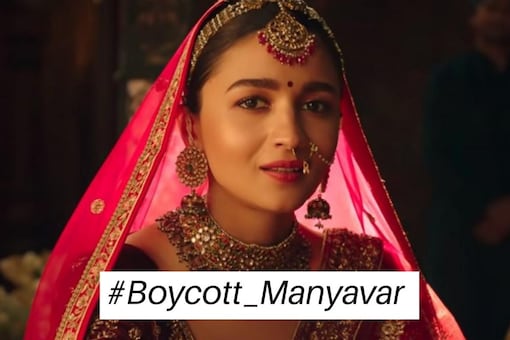A wedding advertisement by clothing brand Manyavar-Mohey has become the talking point of the Indian Internet. Late on Wednesday night and Thursday morning, the hashtag #BoycottManyavar trended on Twitter in Indian region. The backlash from an advertisement that features Bollywood actress Alia Bhatt for the clothing brand. Manyaavar in India is primarily directed at men’s sherwanis, kurtas for wedding fashion, while the female-equivalent of the brand, under the name ‘Mohey’ targets women’s bridal fashion. In the latest advertisement, where Bollywood actress Alia Bhatt is shown at a Hindu wedding ‘mandap’ awaiting the rituals before the marriage is considered finalized, the ad particularly focuses on how often girls in India are considered a burden and sometimes seen as just a liability to only marry off.
In the advertisement, Bhatt questions whether the practice of giving away girls in wedding, ‘Kanya daan’ is something we should be still be doing in the modern age: daughters are not property, and instead the ad ends on the note with the groom’s parents also joining in on the ‘daan’ ritual, with Bhatt summarizing it should be ‘Kanya Maan,’ respecting the daughter instead of ‘donating’ her.
While the ad intended to address the sexism present in the practice, and a very harsh reality of how women are treated even in modern day India, a section of Twitter sees the ad as an attack on Hindu wedding rituals by calling the practice of Kanya-daan in itself regressive.
Several even defended the practice on Twitter, while calling for a #BoycottManyavar.
As per Sanatan culture, the parents of a girl, who get an opportunity of ‘Kanyadaan’, are considered to be fortunate.#Boycott_Manyavar pic.twitter.com/hFd3SEePqq— Monica Singh (@ms_hjs) September 22, 2021
#Boycott_ManyavarDear @Manyavar_ Once contact @TanishqJewelry and ask them what is a boycott…!
Never play with the feelings of Hindus, it will be very expensive!
I repeat never pic.twitter.com/JJ3j1ZoSzX
— Rupesh Gurav (@RupeshG96982026) September 22, 2021
First of all understand our culture, tradition & beliefs and the reason behind "Kanyadan". Stop making such nonsense ads which harms our religious sentiments.#Boycott_Manyavar …..🗣️ pic.twitter.com/wB0XMxZs6N— 𝘼𝙠𝙨𝙝𝙖𝙮 𝙂𝙤𝙨𝙬𝙖𝙢𝙞. (@akshaygoswami_) September 22, 2021
Charity is considered the best in Hindu Dharma !! Similarly, Kanyadan is considered as the best Charity in #Hinduism !
👉 But some heretics are differentiating these orthodox traditions ..!#Boycott_Manyavar pic.twitter.com/IRVV4ZVz3Q
— Mrunali Dharme (@mrunali_dharme) September 22, 2021
Several pointed out that Kanyadaan isn’t literally donating, or ‘daan’ as the name suggests. But Manyavar isn’t the first to be addressing this practice. In a 2019 video that went viral on Twitter, the father of a bride read out a speech at the wedding, adding that his daughter was not property to give away. Though many on social media objected to the idea of the father foregoing the ritual, with some accusing the family of ‘mocking’ Hindu traditions, others held that the move was progressive. The bride’s wedding was conducted by four women priestesses, led by Nandini Bhowmick, who is also a drama enthusiast and professor of Sanskrit. She is well known in Kolkata for performing weddings without the ‘kanyadaan’ ritual. In a 2018 interview to New Indian Express, Bhowmick had said that she did not perform ‘kanyadaan’ as she thought it was a regressive custom. In an interview with SheThePeople, the priestesses had also mentioned that ‘kanyadaan was never a part of the rituals as mentioned in the ancient Rigveda, taken to form the foundation of religious practices in Hinduism.’ Rohini Dharmapal, who is a second-generation priestess, told SheThePeople the increasing popularity of Rigvedic marriages today in the age of gender equality isn’t a style statement: “It is about bringing a paradigm shift. The bride and groom, for instance, have equal participation in the rituals."
In fact, this is not the first time that a family has decided to ignore or modify the ‘kanyadaan’ ritual, traditionally performed by fathers. In 2017, a Nagpur couple made the headlines for having a wedding sans the patriarchal custom. Even last year, the image of a single mother from Chennai performing ‘kanyadaan’ for her daughter at her wedding went viral.
Read all the Latest News, Breaking News and Coronavirus News here









